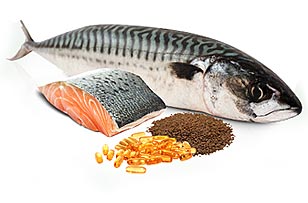Omega-3 Fatty Acids Benefits Throughout Life Stages: Fetal development, Heart Disease, and Alzheimer’s Disease
Throughout life, omega-3 has been associated with healthy living. Fetal development, cardiovascular function, and Alzheimer’s disease prevention depend on the body having adequate amounts of Eicosapentaenoic acid (EPA) and Docosahexaenoic acid (DHA). Omega-3 fatty acids (EPA and DHA) are abundant in fish and fish oil products.
Omega -3 are fatty acids with a myriad of benefits. These fatty acids play a role in inflammatory processes, the development of cell membranes, fetal development, and healthy aging.
Docosahexaenoic acid or DHA is found in large quantities in the eyes and brain. Although we can get some DHA and EPA through diet, it is often not enough.
The standard American diet is low in omega-3 fatty acids. The cause of this is the prevalence of fast food containing high amounts of bad fats. The best way to get some omega-3 is to prepare fresh fish at home. In this article, I will be discussing the importance of omega-3 from infancy to senior adulthood.

Omega-3 Fatty Acids and Fetal Development
The guidelines for pregnant women include a diet high in protein. However, omega-3 has recently been added to the guidelines. There are multiple benefits for the growing baby when the mother consumes EPA and DHA. Babies whose mothers consumed omega-3 fatty acids had the following benefits:
- The babies had significantly better scores on hand and eye coordination.
- Supplementation of omega-3 delayed onset of delivery in women who had experienced preterm delivery in previous pregnancies.
- Supplementation during pregnancy was associated with a reduced incidence of asthma in babies and children.
- Omega-3 supplementation was associated with decreased levels of maternal inflammation.
- At 1 year old, infants whose mothers supplemented had a decreased risk of food allergy and eczema.
Omega 3 Fatty Acids and Pregnancy
During pregnancy, the placenta transfers nutrients from the mother to the baby. Therefore, the amount of omega -3 that the baby gets depends on how much omega-3 the mother consumes.
According to the Department of Health and Human Services, pregnant women should consume 8 to 12 ounces of seafood a week. Ingesting 8–12 oz of seafood per week, depending on the type of fish, is equivalent to around 300–900 mg Omega -3 fatty acids.
Unfortunately, this amount is not being met by most pregnant women in America and Canada, which means that infants may not be receiving adequate amounts of these vital nutrients in the womb.
There have been several studies confirming the benefits of omega-3 supplementation during pregnancy. Large amounts of DHA accumulate in the baby’s tissues during the third trimester.
Omega 3 and Baby Brain Development
Brain function and vision is dependent on the adequate amount of DHA. Studies have shown that babies whose mothers took omega-3 had better problem-solving skills at the age of 9 months than babies whose mothers’ had not supplemented.
Omega -3 is associated with decreased preterm delivery. Carrying a fetus full term is important because prematurity is the cause of the majority of health complications in babies. Preterm delivery is linked to 85% of the deaths in infancy.
There is evidence that mothers who supplemented with DHA have babies who have fewer allergies. The reason for this is that fish oil has been associated with decreased inflammation.
Omega-3 Fatty Acids and the Prevention of Heart Disease
Heart disease is the cause of 40% of deaths in America. Many of these deaths are preventable. Heart disease is thought to be caused by inflammation. Omega-3 has anti-inflammatory properties. Fish oil also plays in a role in the prevention of oxidative stress. Benefits to the cardiac system include:
- Lowering of cholesterol
- Prevention and treatment of heart failure
- Anti-inflammatory effects
- Decreasing clot formation
- Decreases triglycerides
- Improvement of vessel wall function
- Stabilizes plague
- Provides antiarrhythmic effects
- Decreases CRP levels
- EPA+DHA has been associated with a reduced risk of recurrent coronary artery events and sudden cardiac death after an acute myocardial infarction.
Omega-3 has been shown to improve glucose metabolism. People with impaired glucose have a much higher chance of developing heart disease. People treated with EPA had a significantly lower incidence of major cardiac events.
Omega-3 fatty acids have been found to play a role in atherosclerosis and peripheral arterial disease (PAD). These fatty acids improve plaque and increase vascular permeability, thereby decreasing the chance that someone will have a cardiac event.
Omega-3 Fatty Acids Benefits Throughout Life Stages: Fetal development, Heart Disease, and Alzheimer’s Disease
Alzheimer’s is a very devastating disease, and there is no cure. Alzheimer’s is progressive, and it usually starts with memory loss. This disease will will lead to the person not being able to care for themselves, and eventually death.
The number of people suffering from Alzheimer’s is around 28 million, and it is expected to increase to 110,000 by the year 2050.
Studies have shown that when people eat a diet high in omega-3 fatty acids, they are less likely to develop Alzheimer’s disease. Brain models have shown a 40% reduction in brain plague when the person ate a diet rich in omega-3. The largest reductions of plaque were seen in the brain where Alzheimer’s develops.
Unintended weight loss is a problem for people with Alzheimer’s. Omega-3 supplementation has been shown to improve appetite and weight gain.
Conclusion
For years there has been a plethora of studies on the benefits of omega-3. Omega-3 fatty acids are a dietary necessity. Omega-3 are essential in fetal development, cardiovascular disease and neurological protection. Omega-3 fatty acids may be a link to a longer healthier life.




Omega 3 fatty acids are excellent for brain development and heart health.
I was diagnosed with multiple sclerosis 1 month after I turned 50. My Grand-mum was 96 and had it since she was in her 20s. I was on Copaxone, the first year was daily and later I was on 40 mg, 3 times a week. It made a tremendous difference for me. Although the fatigue was what really gets to me. When I do too much, I do start to feel weak.There has been little if any progress in finding a cure or reliable treatment. My multiple sclerosis got significantly worse and unbearable because of my cognitive thinking.. Last year, i started on a natural multiple sclerosis Herbal therapy from Green House Herbal Clinic, i read a lot of positive reviews from patients who used the treatment and i immediately started on it. I had great relief with this herbal treatment. I am doing very much better now, no case of Cognitive thinking or memory Loss,, my multiple sclerosis condition is totally reversed.